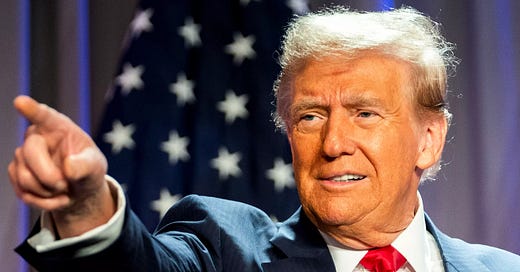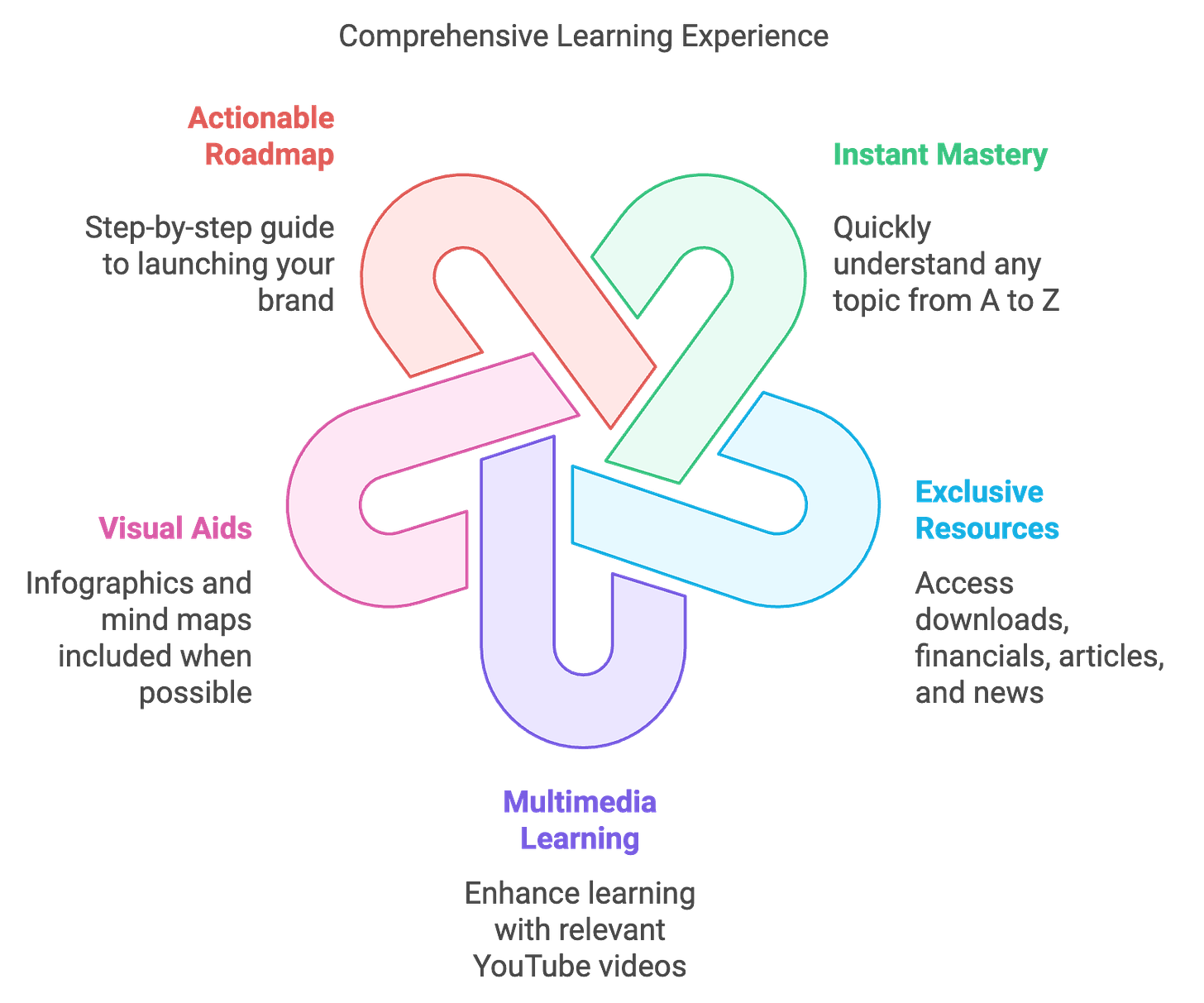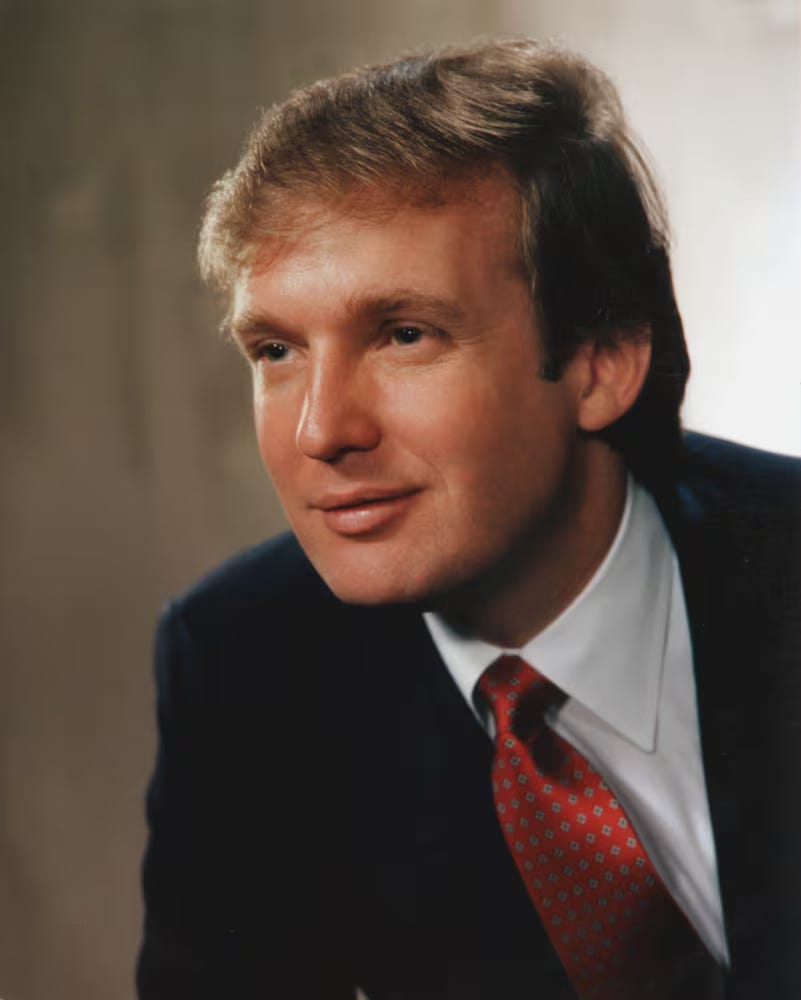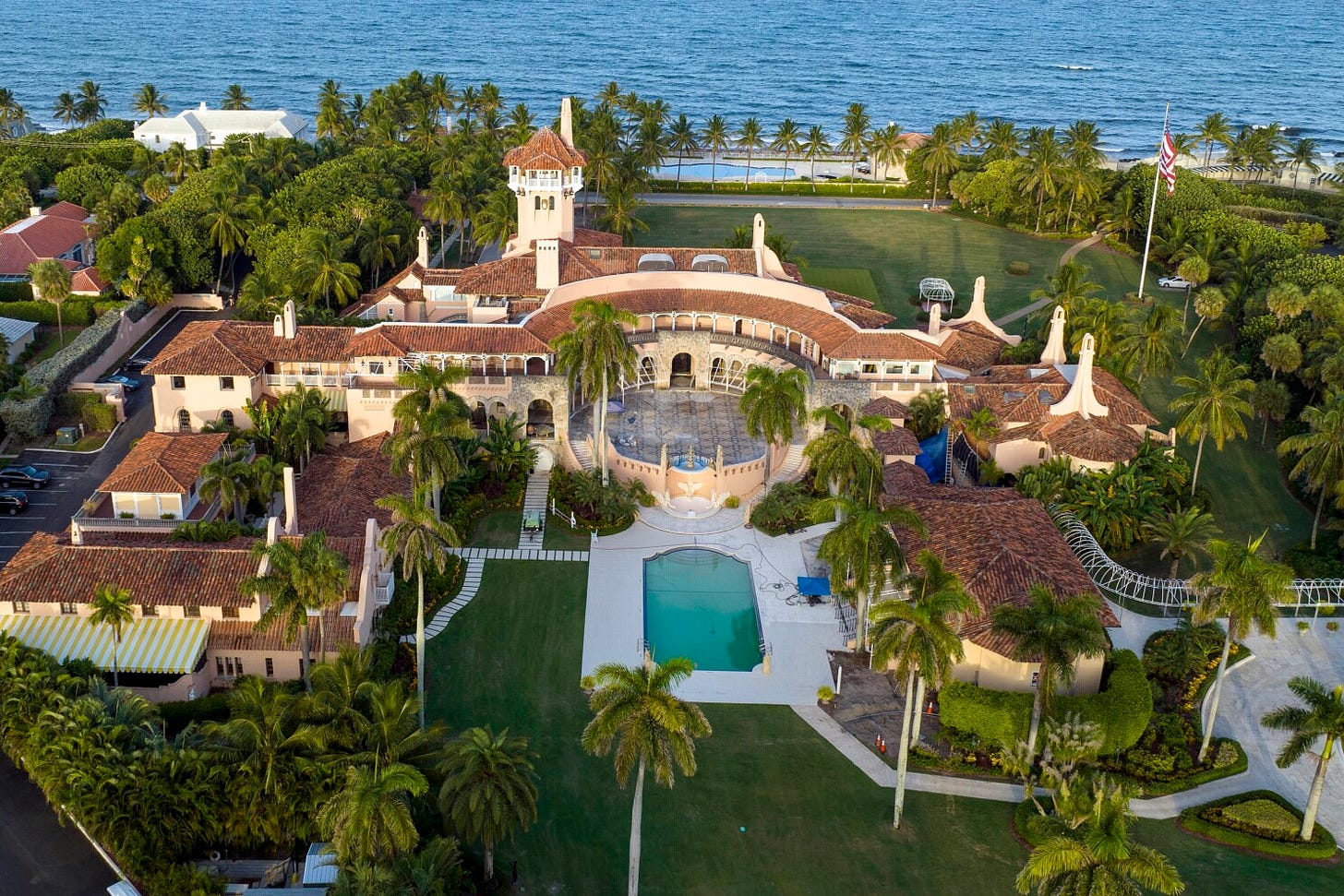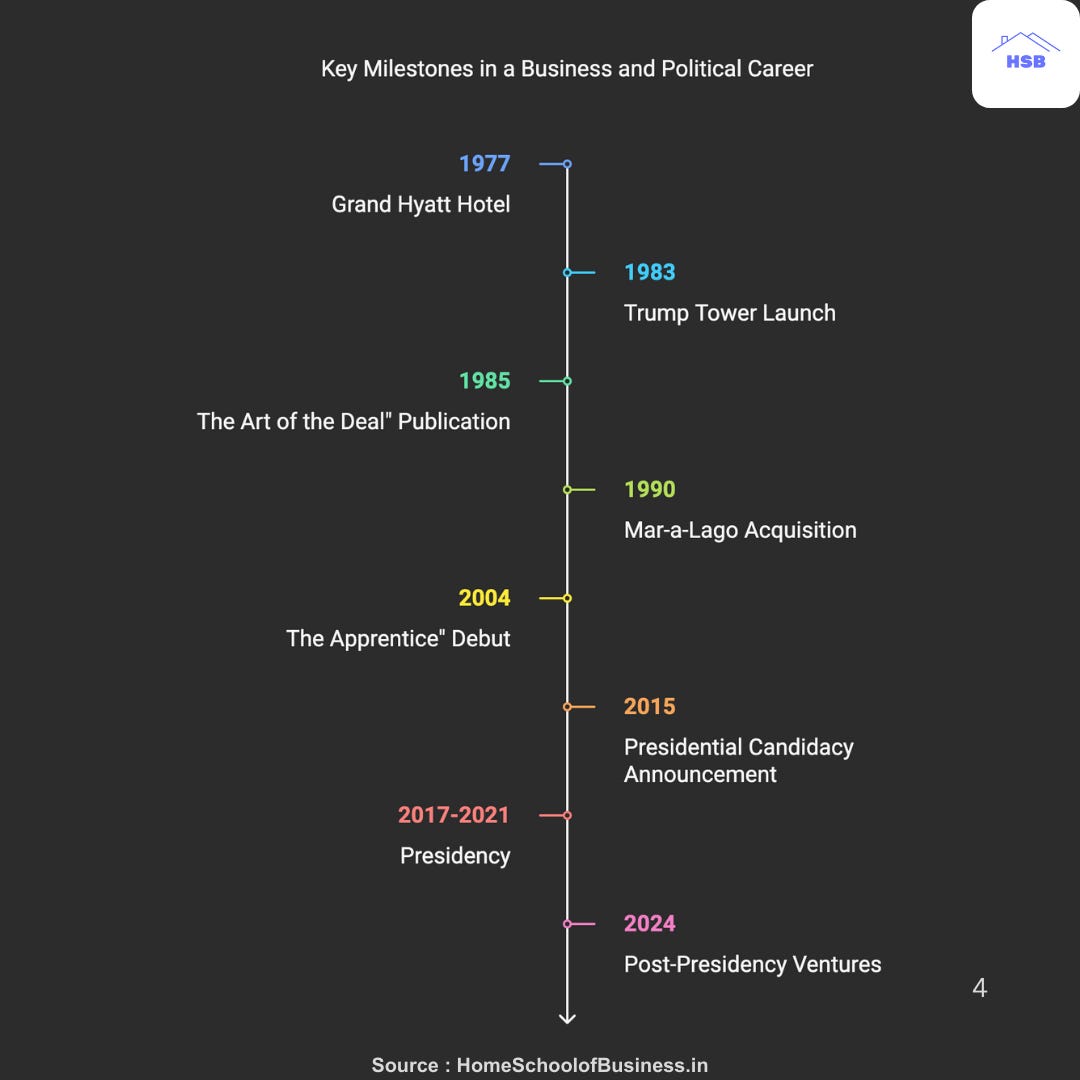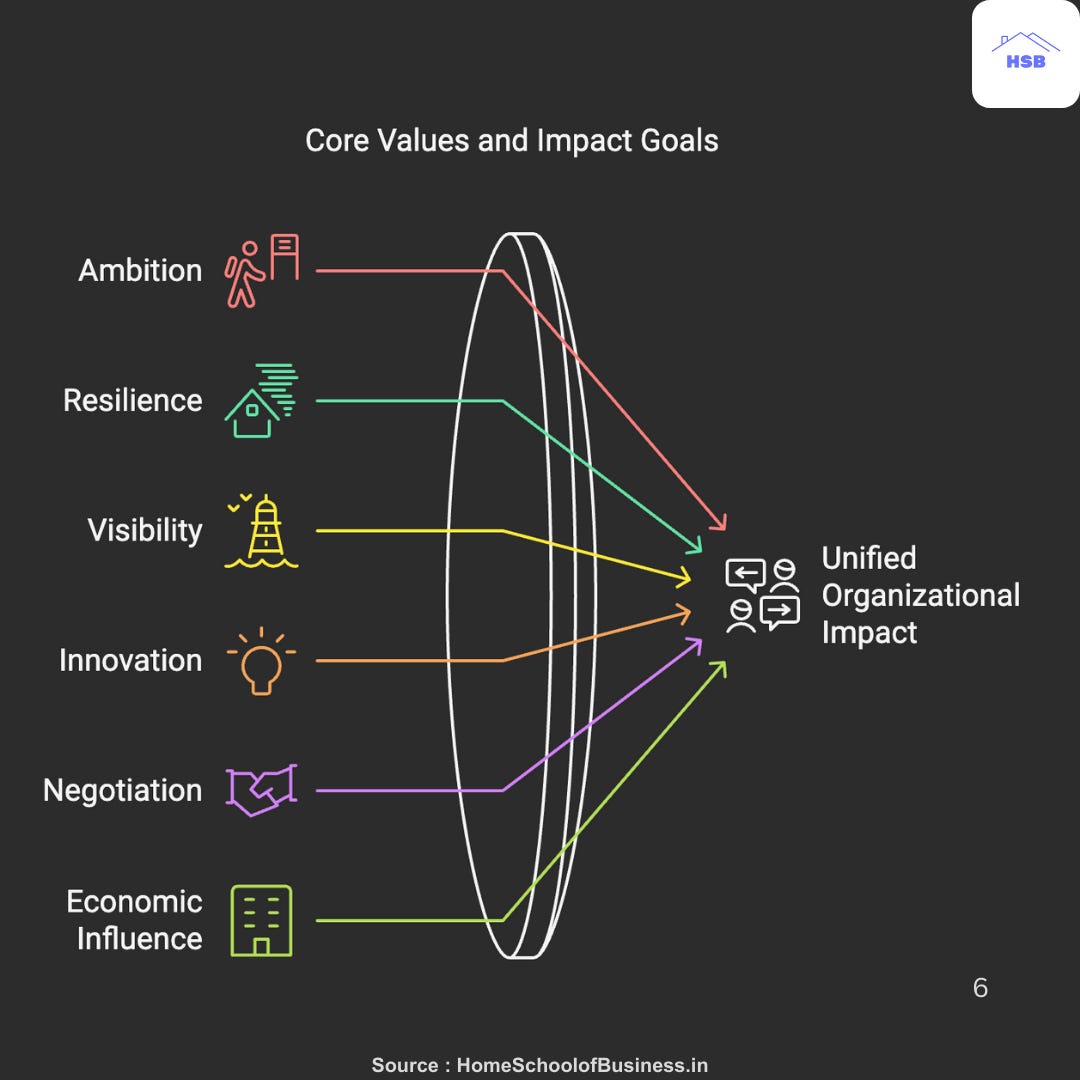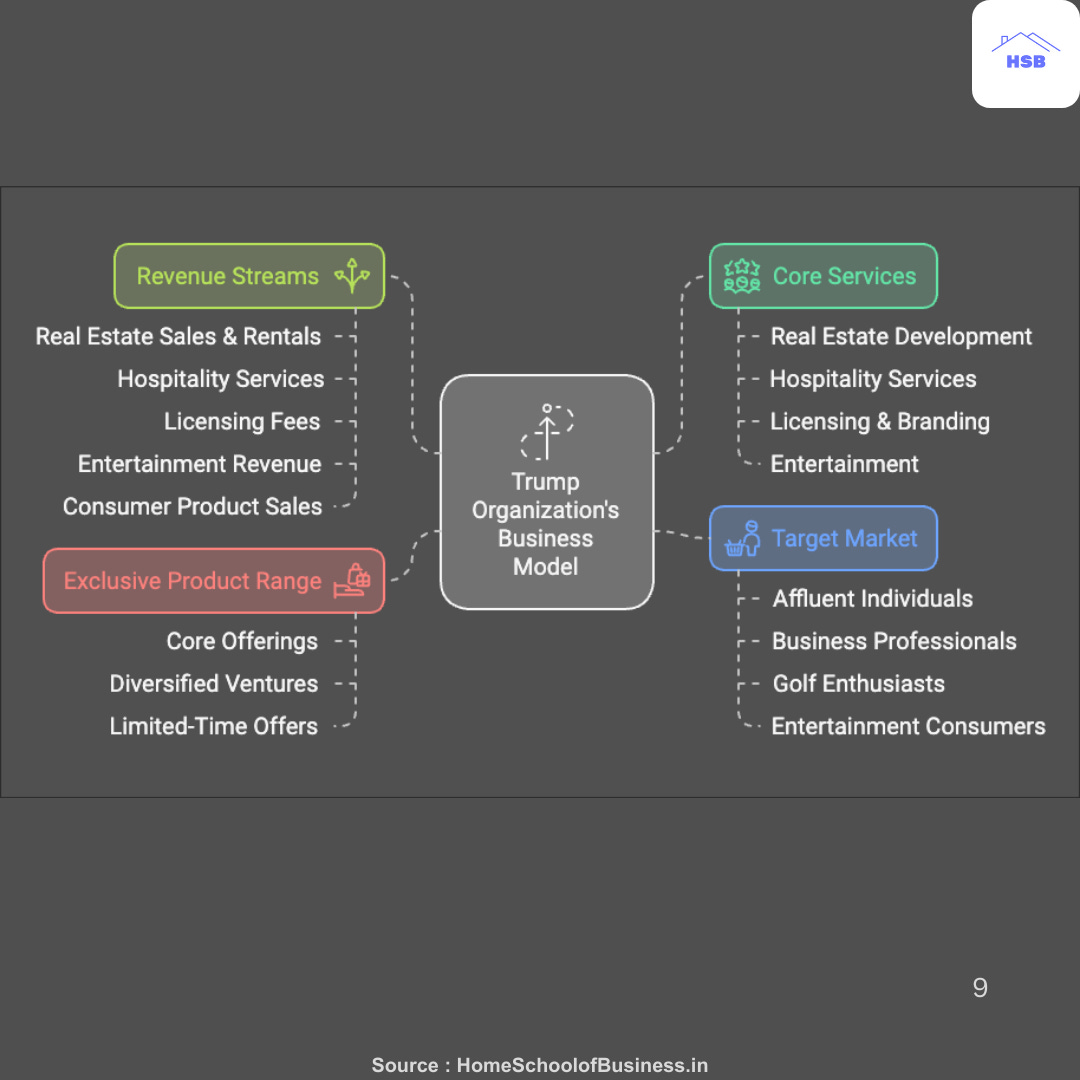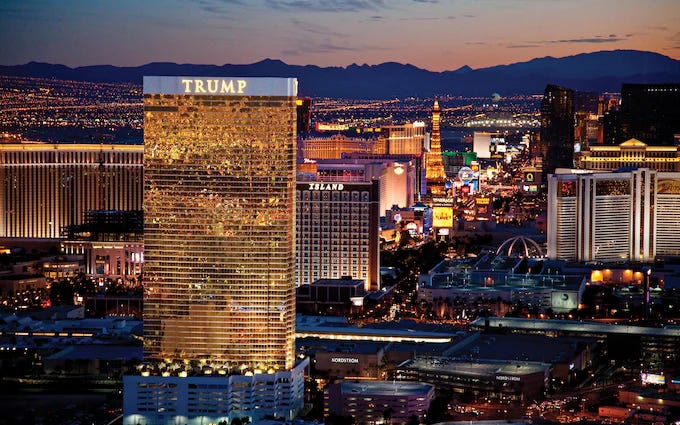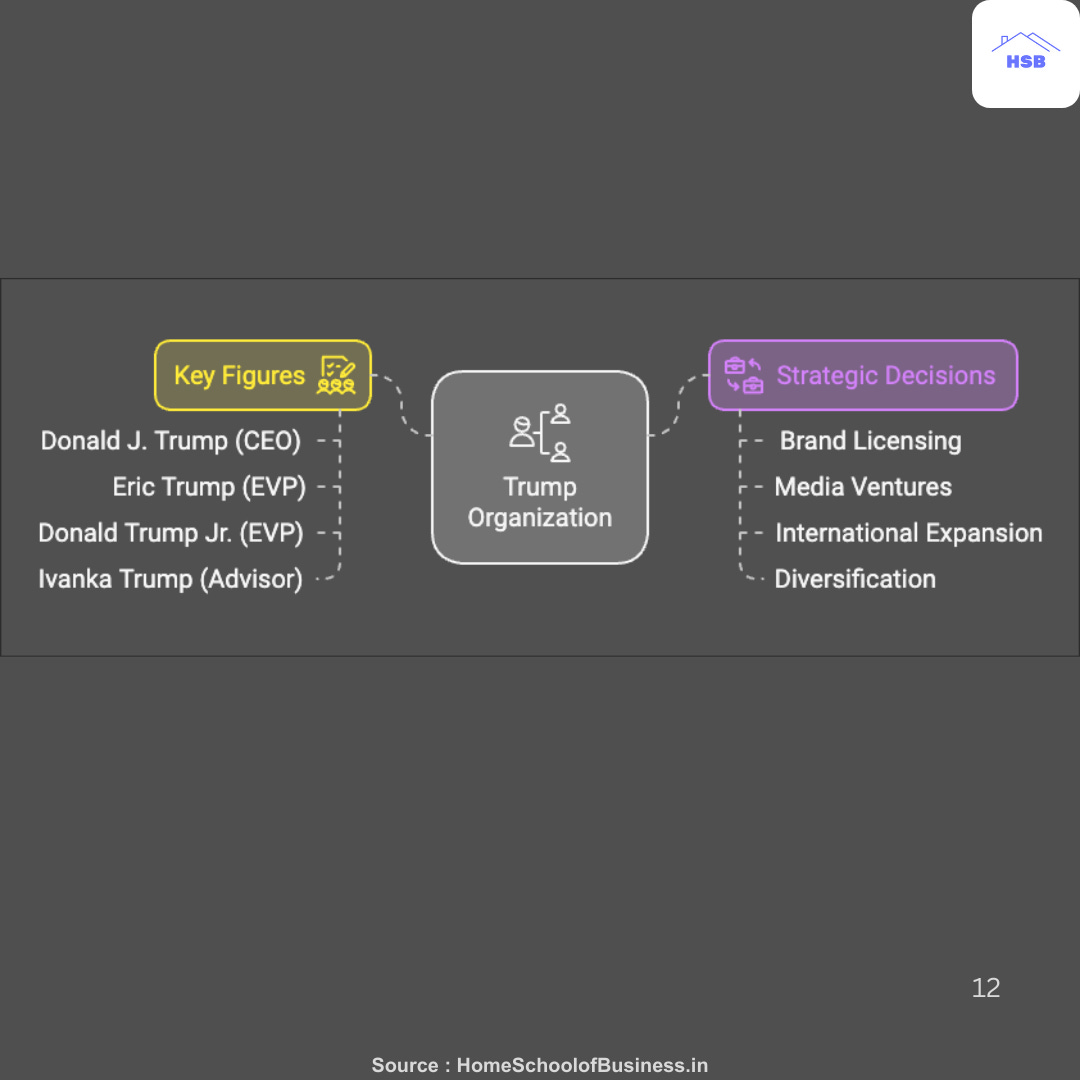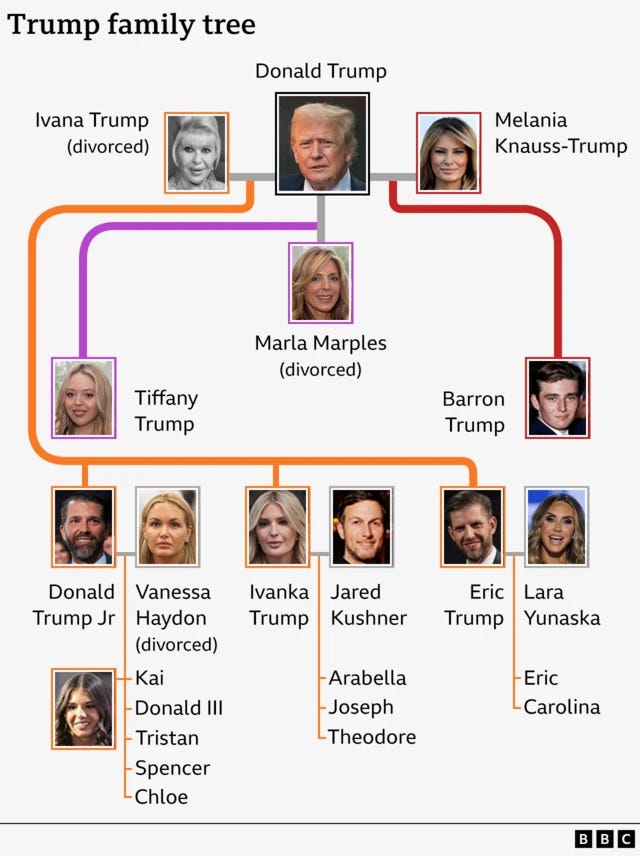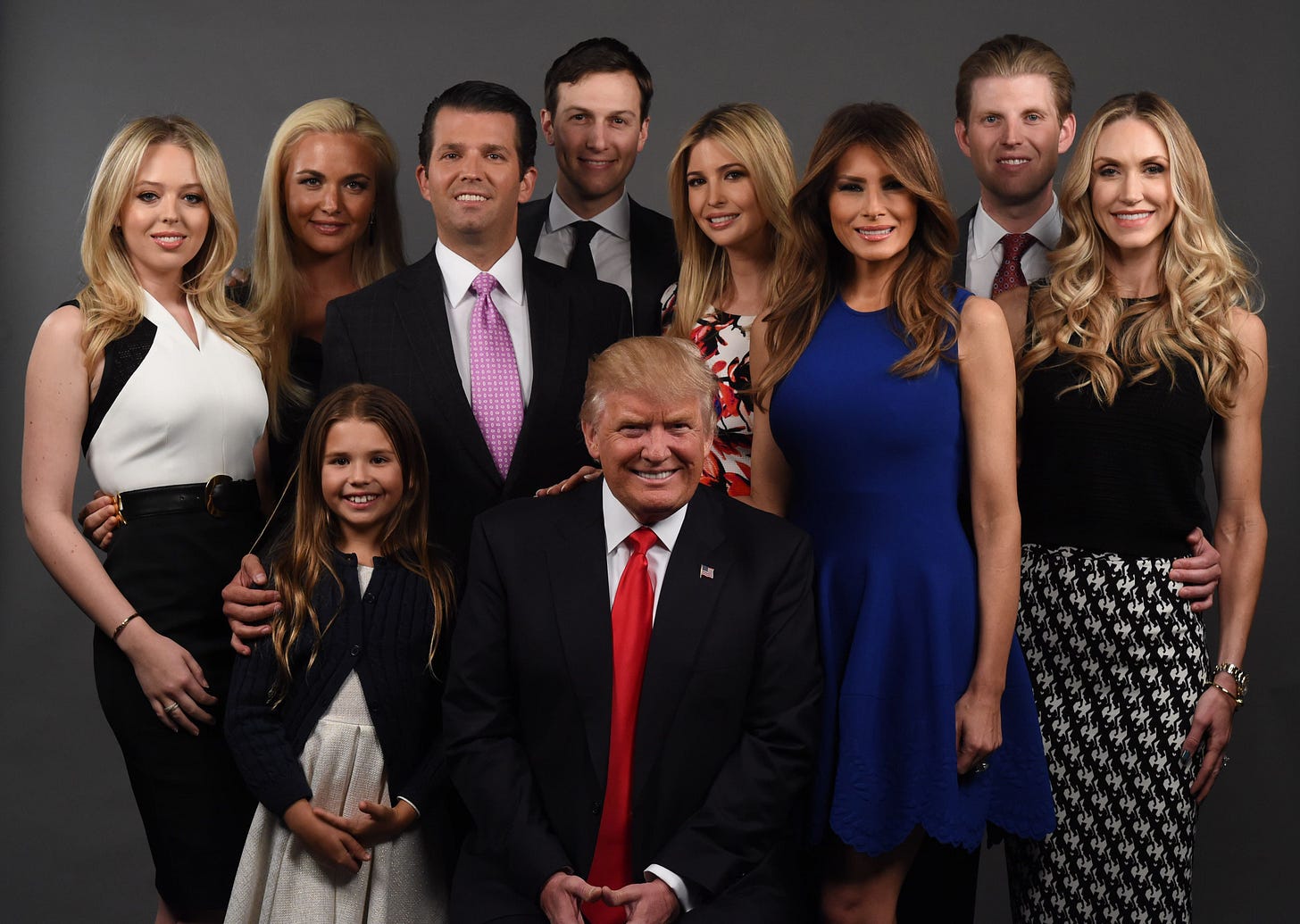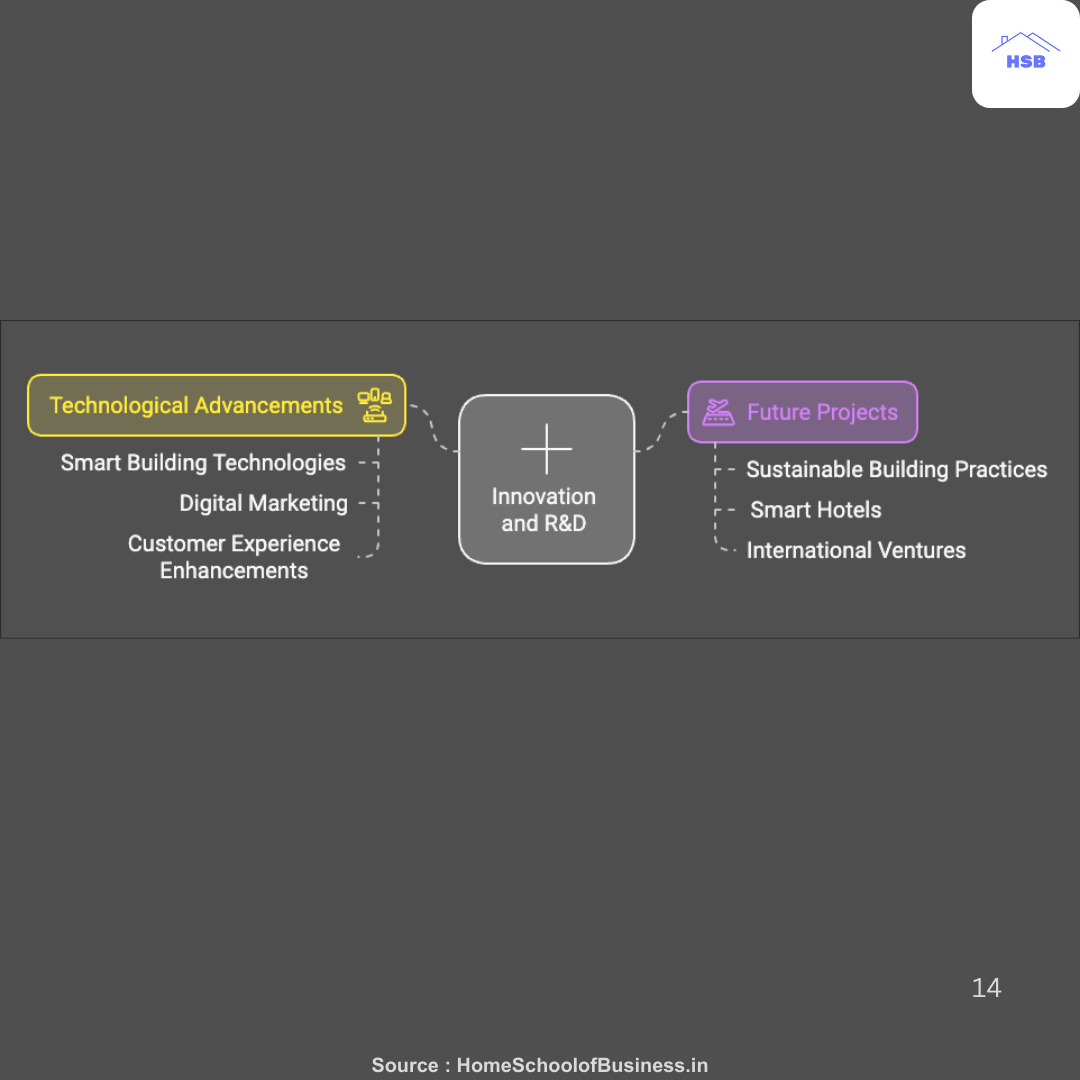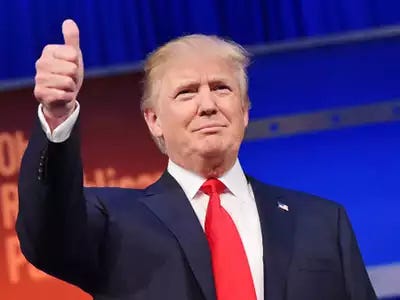Donald Trump’s Business Empire Unveiled: Strategies and Success of a Real Estate Titan
Inside the Tactics, Branding, and Leadership Driving Trump’s Dominance in Business and Politics
Welcome to The Home School of Business!
100+ Posts | 14K+ Entrepreneurs
🚀Now Curated for General Public with more Visuals & Infographics.
Our Mission: Unlocking the secrets of businesses, brands, leaders, and more to inspire entrepreneurs everywhere.
The Home School of Business Website
💬Join our WhatsApp Channel (In a hurry? We’ve packed the highlights of the article right here, paired with the latest breaking news you can’t afford to miss.)
Check out the Quick Summary Insights & Top News Headlines on our Instagram
✨ Experience Home School of Business Podcasts on Spotify Today!
📲 Tap here to open Spotify and enjoy our latest episodes!
Why You'll Love Us:
Donald Trump: A Comprehensive Business Journey
In the dynamic and often tumultuous landscape of American business and politics, Donald Trump stands out as a figure of immense influence and controversy. From his early ventures in real estate to his tenure as the 45th President of the United States, and now as the president-elect set to assume office again in 2025. Trump has left an indelible mark on various industries. This article delves into Donald Trump’s remarkable journey, decoding his success and challenges through a business lens while maintaining an engaging and accessible narrative for the general reader.
Founding Story: From Real Estate to National Prominence
Donald John Trump was born on June 14, 1946, in Queens, New York City. The son of Fred Trump, a successful real estate developer, Donald was introduced to the business world at an early age. Graduating from the Wharton School of the University of Pennsylvania with a degree in economics, Trump joined his father’s company, Elizabeth Trump & Son, which primarily focused on residential real estate in Brooklyn and Queens.
In 1971, Donald Trump took control of the company, rebranding it as The Trump Organization. His vision was to expand beyond residential properties, venturing into high-profile real estate projects in Manhattan. This shift marked the beginning of Trump’s pursuit of grandeur in the real estate industry, emphasizing luxury, opulence, and high returns on investment.
History and Milestones: A Journey of Expansion and Diversification
Donald Trump’s career is punctuated by numerous milestones that highlight his expansion and diversification efforts:
1977: Completion of the Grand Hyatt Hotel in New York City, marking Trump's first major project in Manhattan.
1983: Launch of the Trump Tower, a 58-story skyscraper on Fifth Avenue, symbolizing luxury and architectural prowess.
1985: Publication of his first book, "The Art of the Deal," which became a bestseller and solidified his image as a savvy businessman.
1990: Acquisition of the Mar-a-Lago estate in Florida, expanding his real estate empire into the hospitality sector.
2004: Debut on the reality TV show "The Apprentice," which increased his national visibility and brand recognition.
2015: Announcement of his candidacy for the 45th President of the United States, transitioning from business to politics.
2017-2021: Serving as the 45th President, overseeing various economic policies and business-related initiatives.
2024: Launched several branded products during his presidential campaign, including diamond-encrusted watches and guitars priced up to $100,000, blending business ventures with political activities.
November 2024: Won the U.S. presidential election, becoming the second president in American history to serve non-consecutive terms, following Grover Cleveland.
January 2025: Announced a $20 billion investment in U.S. data centers by Emirati businessman Hussain Sajwani, signaling continued influence in attracting foreign investments to American infrastructure.These milestones reflect Trump’s strategic expansions, branding initiatives, and his ability to leverage media for personal and professional gain.
Rapid Growth: Leadership and Strategic Execution
Donald Trump’s rapid ascent in the business world is attributed to his bold leadership style and strategic execution. His ability to negotiate, take risks, and capitalize on high-profile deals set him apart in the competitive real estate market.
Key Strategies Behind Rapid Growth:
1. Branding and Image:
Luxury and Opulence: Trump positioned his properties as symbols of luxury, attracting high-end clientele and commanding premium prices.
Personal Branding: By associating his name with his properties, Trump created a recognizable and prestigious brand.
2. Strategic Negotiations:
Leveraging Leverage: Trump often negotiated deals that leveraged his assets to gain favorable terms, maximizing profitability.
Media Savvy: Utilizing media coverage to spotlight his projects, Trump generated public interest and investor confidence.
3. Diversification:
Expanding Portfolio: Beyond real estate, Trump diversified into hospitality, entertainment, and licensing his brand for various products.
Risk Management: Diversification helped mitigate risks associated with market fluctuations in the real estate sector.
4. High-Profile Projects:
Landmark Developments: Projects like Trump Tower became iconic landmarks, enhancing his reputation and attracting further investment.
Donald Trump’s relentless pursuit of high-stakes deals and his ability to maintain a strong personal brand were instrumental in his rapid growth, establishing him as a prominent figure in the business world.
Mission and Vision: Shaping Success and Influence
Donald Trump’s mission has consistently revolved around building an empire that epitomizes success, luxury, and influence. His vision extends beyond mere financial gains, aiming to leave a lasting legacy through impactful projects and leadership.
Core Values:
Ambition: Striving for excellence and never settling for mediocrity.
Resilience: Overcoming challenges and bouncing back from setbacks.
Visibility: Maintaining a high public profile to influence and inspire.
Innovation: Pioneering new trends in real estate and business practices.
Negotiation: Mastering the art of deal-making to achieve favorable outcomes.
Impact Goals:
Economic Influence: Contributing to the economy through large-scale projects and job creation.
Social Impact: Engaging in philanthropic activities and supporting various causes.
Cultural Influence: Shaping public discourse through media presence and political involvement.
Trump’s mission and vision encapsulate his desire to build not just a business empire, but also to wield significant influence in economic, social, and political spheres.
Products and Services: Beyond Real Estate
Donald Trump’s business portfolio is diverse, encompassing various products and services that extend his brand’s reach and appeal.
Flagship Offerings:
Real Estate Developments:
Residential Properties: High-end apartments and condos.
Commercial Spaces: Office buildings and retail spaces.
Hospitality: Luxury hotels and resorts like Trump International Hotel and Tower.
Entertainment:
Television: Hosting "The Apprentice," which showcased his business acumen.
Books: Authoring bestsellers that promote his business philosophy.
Licensing:
Consumer Products: Clothing lines, home furnishings, and other branded merchandise.
Media: Licensing his name for various media appearances and endorsements.
Golf Courses:
Trump Golf: A network of golf courses worldwide, catering to enthusiasts and professionals alike.
Customer Benefits:
Trump’s offerings provide exclusivity, luxury, and a sense of prestige. Customers associate his brand with high quality, superior service, and a lifestyle of success and elegance.
Market Position and Competition: Leading with Influence
In the highly competitive real estate and business landscape, Donald Trump has carved out a unique position through his distinctive branding and strategic ventures.
Industry Standing:
Real Estate Moguls:
Competitors: Jeff Bezos, Stephen Ross, and other prominent real estate developers.
Competitive Edge: Trump’s personal brand and high-profile projects set him apart in the market.
Entertainment Industry:
Competitors: Various media personalities and reality TV stars.
Competitive Edge: His authentic business persona and engaging television presence.
Political Arena:
Competitors: Other political figures and business leaders entering politics.
Competitive Edge: Leveraging his business success and media savvy to gain political support.
Competitive Edge:
Strong Personal Brand: A recognizable and prestigious brand that commands attention and loyalty.
Media Presence: Effective use of media to stay in the public eye and influence public opinion.
Diverse Portfolio: A wide range of businesses that mitigate risks and capitalize on multiple revenue streams.
Negotiation Skills: Proven ability to secure favorable deals and maximize profitability.
Donald Trump’s ability to maintain a prominent market position amidst fierce competition underscores his strategic prowess and influential presence.
Business Model: The Trump Organization
The Trump Organization serves as the central hub for Donald Trump’s diverse business ventures, operating under a complex and multifaceted business model.
Core Services:
Real Estate Development: Building and managing high-end residential and commercial properties.
Hospitality Services: Operating luxury hotels and resorts.
Licensing and Branding: Monetizing the Trump name through various consumer products and media engagements.
Entertainment: Producing and hosting television shows that enhance brand visibility.
Exclusive Product Range:
Core Offerings:
Residential Properties: Luxury apartments and condominiums.
Commercial Real Estate: Office buildings and retail spaces.
Hospitality: High-end hotels and resorts.
Diversified Ventures:
Entertainment: Television shows and media appearances.
Consumer Products: Branded merchandise like clothing, home furnishings, and accessories.
Golf Courses: Exclusive golf facilities catering to enthusiasts.
Limited-Time Offers:
Special Promotions: Seasonal or event-based promotions in hospitality and real estate.
Exclusive Deals: Limited-time offers on property sales or hospitality packages.
Revenue Streams:
Real Estate Sales and Rentals:
Property Sales: Revenue from selling residential and commercial properties.
Rental Income: Steady income from leasing properties.
Hospitality Services:
Hotel Bookings: Revenue from room bookings and event hosting.
Golf Course Fees: Income from golf course memberships and green fees.
Licensing Fees:
Brand Licensing: Fees from licensing the Trump name for various products and services.
Media Licensing: Revenue from media appearances and endorsements.
Entertainment Revenue:
Television Shows: Income from hosting and producing TV programs.
Book Sales: Earnings from publishing bestsellers.
Consumer Product Sales:
Merchandise: Revenue from selling branded consumer products.
Target Market:
Affluent Individuals:
Luxury Seekers: Customers looking for high-end real estate and exclusive hospitality services.
Business Professionals:
Corporate Clients: Businesses seeking premium office spaces and meeting venues.
Golf Enthusiasts:
Sporting Community: Individuals interested in exclusive golf facilities and memberships.
Entertainment Consumers:
Media Audience: Viewers and readers engaged with Trump’s media presence and publications.
Financial Analysis of The Trump Organization
Donald Trump’s business ventures have demonstrated significant financial performance, marked by substantial revenue generation and strategic investments.
Financial Performance:
Estimated Revenue (2023): Approximately $2 billion
Growth Drivers: Real estate sales, hospitality services, licensing fees, and media ventures.
Investment Highlights:
Real Estate Projects: High-profile developments like Trump Tower generate significant revenue and brand prestige.
Hospitality Expansion: Growth in hotel and golf course operations contributes to steady income streams.
Media Ventures: "The Apprentice" and other media engagements enhance brand visibility and revenue.
Licensing Deals: Strategic licensing agreements monetize the Trump brand across various product lines.
Profitability:
Net Profit Margin: Varies by sector, with real estate and hospitality typically achieving margins between 10-20%.
Consistent Earnings: Driven by diversified revenue streams and high-value projects.
Revenue Streams:
Real Estate Sales & Rentals: The Trump Organization's real estate holdings, including properties like 40 Wall Street and Trump Tower in New York, continue to contribute to the company's revenue. However, the commercial real estate market in New York has faced challenges, potentially impacting this segment's performance.
Hospitality Services: The organization's golf and resort properties, particularly in Florida, have become significant sources of revenue. Mar-a-Lago Club in Palm Beach is expected to generate an estimated $24 million in cash in 2024, with other properties like Trump National Doral contributing positively to the cash flow.
Licensing Fees: Income from licensing fees and royalties remains a component of Trump's revenue stream. In 2022, he reported $30.4 million in such income, reflecting the ongoing monetization of the Trump brand across various product lines.
Entertainment & Consumer Products: Trump Media & Technology Group (TMTG), which operates the social media platform Truth Social, reported $4.1 million in revenue for 2023 but faced a net loss of $58.2 million. The company's valuation has fluctuated, with Trump's stake significantly influencing his net worth.
Cost Structure:
Cost of Goods Sold (COGS): 25-30%
Real Estate Development: Construction and material costs.
Hospitality Operations: Maintenance and service costs.
Operating Expenses: 40-45%
Marketing and Branding: Advertising and promotional expenses.
Salaries and Wages: Employee compensation across all ventures.
Administrative Expenses: 15-20%
Corporate Overheads: Office operations and administrative costs.
Depreciation: 5-10%
Asset Depreciation: Real estate and equipment depreciation.
Profitability Metrics:
Gross Profit Margin: ~50-60%
Insight: Strong margins indicate effective cost management and high-value offerings.
Operating Profit Margin: ~15-20%
Insight: Reflects robust operational efficiency and strategic cost management.
Net Profit Margin: ~10-15%
Insight: Healthy net margins driven by diversified income streams and controlled expenses.
Return on Equity (ROE): ~20-25%
Insight: Demonstrates effective use of shareholders' funds to generate profits.
Return on Assets (ROA): ~10-15%
Insight: Indicates efficient utilization of assets to generate income.
Key Financial Ratios:
Current Ratio: 1.2-1.5
Insight: Adequate liquidity to meet short-term obligations.
Debt-to-Equity Ratio: 0.8-1.2
Insight: Balanced leverage, indicating manageable debt levels.
Earnings Per Share (EPS): N/A
Insight: As a privately held entity, EPS is not applicable.
Trend Analysis:
Revenue Growth: Steady 5-10% annual increase, driven by expansion in real estate and hospitality sectors.
Profit Margins: Improving through cost optimization and strategic investments.
Capital Expenditures (CapEx): Increasing investments in new projects and technology upgrades.
Dividend Growth: Not applicable, as The Trump Organization is privately held.
Comparison with Competitors:
Revenue:
The Trump Organization: ~$2B vs. Related Companies: ~$10B, Vornado Realty Trust: ~$3B
Profit Margins:
The Trump Organization: 10-20% vs. Related Companies: 15-25%, Vornado Realty Trust: 10-20%
ROE:
The Trump Organization: 20-25% vs. Related Companies: 15-20%, Vornado Realty Trust: 10-15%
Financial Challenges and Risks:
Market Volatility:
Impact: Fluctuations in real estate markets can affect property values and sales.
Regulatory Risks:
Impact: Changes in zoning laws, tax policies, and international regulations can impact operations.
Brand Reputation:
Impact: Controversies and political involvement may influence consumer and investor perceptions.
Debt Management:
Impact: High levels of debt in real estate projects can pose financial risks during economic downturns.
Future Financial Prospects:
Revenue Growth:
Projection: Continued expansion in real estate and hospitality sectors, with potential growth in new ventures like finance and health.
Profitability Enhancements:
Strategies: Ongoing cost optimizations, strategic partnerships, and high-value project acquisitions.
Investment Focus:
Areas: Technology upgrades, sustainable building practices, and international market expansion.
Shareholder Returns:
Commitment: As a privately held entity, shareholder returns are managed internally through reinvestments and strategic growth.
Summary of Financial Health:
Strong Revenue Growth: Driven by diversified business ventures and strategic real estate projects.
Healthy Profit Margins: Maintained through effective cost management and high-value offerings.
Solid Cash Flow: Ensures liquidity for ongoing investments and operational needs.
Balanced Debt Levels: Manageable leverage with a focus on sustainable growth.
Resilient Structure: Diverse revenue streams and strategic risk management contribute to financial stability.
Leadership and Management: Visionary Guidance
Donald Trump’s leadership style is characterized by assertiveness, strategic vision, and a hands-on approach. His ability to inspire, negotiate, and make decisive moves has been pivotal in steering his business ventures towards success.
Key Figures:
Donald J. Trump (CEO): The driving force behind The Trump Organization, overseeing strategic decisions and high-profile projects.
Eric Trump (Executive Vice President): Manages day-to-day operations and oversees the hospitality and real estate sectors.
Donald Trump Jr. (Executive Vice President): Focuses on business development, brand expansion, and strategic partnerships.
Ivanka Trump (Advisor): Handles brand licensing, consumer products, and philanthropic initiatives.
Strategic Decisions:
Under Trump’s leadership, The Trump Organization has focused on high-value real estate projects, strategic branding, and diversification into various business sectors. Key decisions include:
Brand Licensing: Monetizing the Trump name across a wide range of products and services.
Media Ventures: Launching and maintaining a strong media presence through television shows and publications.
International Expansion: Venturing into global markets with real estate and hospitality projects in key international cities.
Diversification: Expanding into new sectors like golf courses, consumer products, and entertainment to create multiple revenue streams.
Trump’s leadership has been instrumental in building a robust and recognizable brand, enabling the organization to thrive in competitive markets.
Corporate Culture and Employee Insights: Fostering Ambition and Excellence
The Trump Organization is renowned for its high-performance culture, emphasizing ambition, excellence, and a results-driven approach.
Work Environment:
High Expectations: Employees are expected to maintain high standards of performance and professionalism.
Incentivized Performance: Competitive compensation and performance-based incentives encourage employees to excel.
Collaborative Atmosphere: Teamwork and collaboration are promoted to achieve common business goals.
Innovation Encouraged: Employees are encouraged to bring innovative ideas to the table, fostering a culture of continuous improvement.
Innovation and Research & Development: Driving the Future of Real Estate and Hospitality
Innovation is a cornerstone of Donald Trump’s business strategy, driving the future of real estate and hospitality through continuous improvement and technological advancements.
Technological Advancements:
Smart Building Technologies: Implementing advanced technologies in construction and building management to enhance efficiency and sustainability.
Digital Marketing: Leveraging digital platforms and social media to market properties and engage with customers.
Customer Experience Enhancements: Utilizing data analytics and AI to personalize customer experiences in hospitality services.
Future Projects:
Sustainable Building Practices: Investing in green technologies and sustainable building materials to reduce environmental impact.
Smart Hotels: Developing hotels equipped with the latest smart technologies for enhanced guest experiences.
International Ventures: Exploring opportunities for innovative real estate and hospitality projects in emerging global markets.
The Trump Organization’s commitment to innovation ensures that it remains at the forefront of industry trends, adapting to changing market dynamics and consumer preferences.
Social Responsibility and Sustainability: Committed to Positive Impact
Donald Trump integrates social responsibility and sustainability into his business model, striving to make a positive impact on society and the environment.
CSR Initiatives:
Trump Foundation: Engages in philanthropic activities, supporting various causes and community projects.
Educational Programs: Offers scholarships and educational opportunities to support employee development and community education.
Disaster Relief: Provides support and resources to communities affected by natural disasters through donations and assistance programs.
Sustainability Practices:
Eco-Friendly Construction: Utilizes sustainable building materials and energy-efficient designs in real estate projects.
Green Hospitality: Implements eco-friendly practices in hotels and resorts, such as energy conservation and waste reduction.
Sustainable Sourcing: Commits to sourcing materials responsibly, ensuring environmental and social standards are met.
Donald Trump’s focus on social responsibility and sustainability reflects his commitment to ethical business practices and contributing positively to the communities he serves.
Customer Engagement and Community Building: Building Lasting Relationships
Donald Trump prioritizes building strong relationships with customers and communities through personalized interactions and active engagement.
Customer Relationships:
Personalized Service: Offering tailored services and experiences to meet individual customer needs and preferences.
Feedback Mechanisms: Actively seeking and incorporating customer feedback to improve products and services.
Loyalty Programs: Implementing loyalty programs to reward repeat customers and foster long-term relationships.
Community Involvement:
Local Partnerships: Collaborating with local businesses and organizations to support community initiatives and economic growth.
Philanthropic Efforts: Engaging in charitable activities and donations to support various social causes and community projects.
Event Sponsorships: Sponsoring local events and activities to enhance community engagement and brand presence.
The Trump Organization’s commitment to customer engagement and community building strengthens its reputation and fosters loyalty among customers and local communities.
Challenges and Opportunities: Navigating a Dynamic Market
Despite its successes, The Trump Organization faces several challenges and opportunities as it continues to expand and innovate.
Current Challenges:
Market Volatility: Fluctuations in the real estate market can impact property values and sales.
Regulatory Environment: Navigating complex zoning laws, tax policies, and international regulations can pose operational challenges.
Brand Perception: Controversies and political involvement may affect consumer and investor perceptions of the brand.
Economic Downturns: Economic recessions can reduce consumer spending on luxury real estate and hospitality services.
Future Opportunities:
Global Expansion: Expanding into emerging markets with high growth potential in real estate and hospitality.
Technological Integration: Adopting advanced technologies to enhance operational efficiency and customer experiences.
Sustainability Initiatives: Increasing focus on sustainable building practices to attract environmentally conscious consumers and reduce operational costs.
Diversification: Exploring new business verticals, such as financial services and health-related ventures, to diversify revenue streams.
By addressing these challenges and capitalizing on emerging opportunities, The Trump Organization can continue to thrive in a competitive and evolving market.
Future Plans and Strategic Vision: Shaping the Future of Real Estate and Beyond
Donald Trump’s strategic vision focuses on sustained growth, innovation, and expanding The Trump Organization’s service offerings to meet evolving customer needs.
Growth Strategies:
Scaling Operations: Expanding the network of real estate developments and hospitality services to cover more regions and increase market presence.
Entering New Markets: Exploring international expansion opportunities to replicate success in new countries and regions.
Diversifying Offerings: Launching new products and services, such as smart home technologies and premium hospitality packages, to diversify revenue streams.
Long-Term Goals:
Global Leadership: Establishing The Trump Organization as a leading global brand in real estate and hospitality.
Sustainable Growth: Ensuring growth is achieved through sustainable and ethical business practices.
Innovative Solutions: Continuously developing innovative solutions to enhance customer experiences and operational efficiency.
Legacy Building: Creating a lasting legacy through impactful projects and contributions to the business and community.
Trump’s long-term vision encompasses a future where The Trump Organization seamlessly integrates various services—luxury real estate, premium hospitality, and innovative business ventures—into a unified ecosystem that enhances the lives of millions of customers worldwide.
Building a Similar Brand: Roadmap for Aspiring Entrepreneurs
For those inspired by Donald Trump’s success and aiming to build a similar brand, the following roadmap outlines key steps and strategies:
1. Develop a Clear Mission and Vision:
Define Core Purpose: Establish the fundamental purpose of your business.
Set Long-Term Goals: Align your long-term objectives with your mission to guide strategic decisions.
2. Focus on Quality and Consistency:
High-Quality Offerings: Ensure your products and services meet high standards of quality.
Standardized Processes: Implement consistent processes across all operations to maintain reliability.
3. Implement Scalable Systems and Processes:
Efficient Operations: Develop operational systems that can be easily replicated and scaled.
Invest in Technology: Utilize technology to streamline operations and enhance customer experiences.
4. Adopt a Scalable Business Model:
Franchising or Licensing: Consider models that facilitate rapid expansion without significant capital expenditure.
Adaptability: Ensure your business model can adapt to different markets and scales effectively.
5. Invest in Marketing and Brand Building:
Strong Brand Identity: Create a brand identity that resonates with your target audience.
Diverse Marketing Channels: Utilize various marketing channels, including digital platforms, to build brand awareness.
6. Embrace Innovation:
Continuous Innovation: Regularly develop new products and services to stay ahead of market trends.
R&D Investment: Invest in research and development to enhance your offerings and operational efficiency.
7. Commit to Customer Satisfaction:
Prioritize Feedback: Listen to customer feedback and continuously improve based on their needs.
Excellent Service: Foster strong customer relationships through exceptional service and engagement.
8. Build a Strong Supply Chain:
Reliable Partnerships: Develop strong partnerships with suppliers to ensure consistent quality and availability.
Optimize Supply Chain: Streamline your supply chain to reduce costs and enhance efficiency.
9. Focus on Operational Excellence:
Maximize Efficiency: Streamline operations to maximize productivity and minimize waste.
Best Practices: Implement industry best practices in management and operations to drive success.
10. Ensure Sustainable Practices:
Eco-Friendly Operations: Adopt sustainable practices to minimize your environmental footprint.
Promote Sustainability: Make sustainability a core value to attract environmentally conscious consumers.
11. Cultivate a Positive Corporate Culture:
Inclusive Environment: Foster an inclusive and collaborative work environment.
Employee Development: Invest in training and development to build a motivated and skilled workforce.
12. Adapt to Market Dynamics:
Stay Informed: Keep abreast of changing market trends and consumer preferences.
Agility: Be prepared to pivot your strategies to meet evolving demands.
By following this roadmap, aspiring entrepreneurs can emulate Donald Trump’s success, building a brand that combines business acumen with a mission-driven approach to create lasting value and impact.
Industry Trends and Company Adaptation: Staying Ahead of the Curve
The real estate and hospitality industries are constantly evolving, influenced by technological advancements and changing consumer behaviors. Donald Trump’s adeptness at adapting to these trends has been crucial in maintaining his competitive edge.
Market Trends:
Digital Transformation: Increasing reliance on digital platforms for property listings, virtual tours, and online bookings.
Sustainability Focus: Growing demand for eco-friendly and sustainable buildings and hospitality services.
Smart Technologies: Integration of smart home technologies and automation in real estate and hospitality.
Health and Wellness: Rising interest in wellness-focused amenities and environments in hospitality services.
Personalization: Consumers seeking personalized and customized experiences in both real estate and hospitality.
Strategic Adjustments:
Technological Integration: Implementing advanced technologies to enhance operational efficiency and customer experiences.
Sustainable Practices: Adopting green building practices and eco-friendly initiatives to meet consumer demand and regulatory requirements.
Diversified Offerings: Expanding service offerings to include wellness amenities and personalized services.
Market Expansion: Entering new geographic markets and diversifying into related business sectors to capture emerging opportunities.
Donald Trump’s proactive approach to industry trends ensures that The Trump Organization remains relevant and competitive in a rapidly changing market landscape.
Conclusion: A Multifaceted Legacy Ahead
Donald Trump’s relentless pursuit of success, strategic vision, and ability to navigate complex business landscapes have positioned him as a formidable figure in the realms of real estate, entertainment, and politics. With a clear mission, strong leadership, and a commitment to expanding his business ventures, Trump continues to influence various industries and public discourse.
As The Trump Organization evolves, it remains dedicated to building luxury real estate, providing premium hospitality services, and engaging with communities through strategic initiatives. Trump’s legacy is not just one of business triumphs, but also of shaping the dynamics of real estate development and hospitality services in the modern era.
Donald Trump exemplifies how a combination of ambition, strategic execution, and personal branding can create a lasting impact across multiple sectors. As the organization continues to innovate and expand, it stands as a testament to what can be achieved when vision meets relentless pursuit of excellence.
Donald Trump’s journey underscores the importance of strategic vision, adaptability, and relentless ambition in building and sustaining a successful business empire. Whether through high-profile real estate projects, influential media presence, or political endeavors, Trump’s multifaceted legacy continues to shape industries and inspire aspiring entrepreneurs worldwide.
HSB Important Articles and References :Share your feedback and tell us which case studies you'd like to see next by filling out this quick Google form! Click Here
Check and follow up:
1) WhatsApp Channel : Click Here
2) Instagram : https://www.instagram.com/homeschoolofbusiness.in/
Did you know this about Donald Trump?
How he went from Real Estate to Politics?
How was the life before presidency?
Did you know about The Trump Organization?
Companies Owned by Donald Trump
Did you know this about the Trump Tower?
Explore the Trump Tower
The Donald Trump Family
The Business Career of Trump
Trump Media Annual Reports
The Personality and Leadership Style of Donald Trump in the Office
HSB Video Vault :-
The Home School of Business WEBSITE
Best Regards,
The Home School of Business Team

